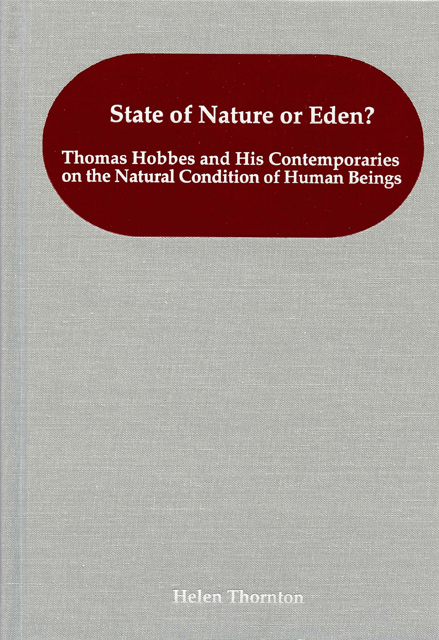 State of Nature or Eden?
State of Nature or Eden? STATE OF NATURE OR EDEN?
In one of the most famous quotations from the history of political philosophy, Thomas Hobbes described the life of human beings in the state of nature as ‘solitary, poor, nasty, brutish and short’. In this natural condition human beings lived alone in a state of: equality, constant fear of death, war, and general insecurity. It was a state in which there was no dominion, no law, and no property. If human beings were reasonable, they would soon conclude that it was a state that was incompatible with their ultimate aim to avoid death, and then they would wish to leave it. For Hobbes, the state of nature was a logical account of the origins of society, but it was also a constantly recurring possibility, because it was any period of time in which a society lacked a common power to keep order. As Edwin Curley has pointed out, this was a description of England during the 1640s. But for many of Hobbes’ contemporaries, the state of nature was understood to be a description of the pre-historic origin of society, and in this way it was also related to the Edenic condition. The problem for Hobbes’ seventeenth century readers was how to reconcile his description, of the condition of human beings before civil society came into existence, with the Biblical account of the original, perfect condition of human beings at the creation? As Sir Robert Filmer put it, Hobbes’ state of nature simply contradicted ‘the truth of the history of the creation’, while Leibniz pointed out that since Hobbes did not deny the existence of God as the ruler of the world, there could never have been such a time as the state of nature, i.e. there could never have been a time when human beings had lived without a common power.
In both the Elements of Law Natural and Politic, and De Cive, Hobbes did not claim that his state of nature had existed at a specific point in history, only that there were both past and present people who had lived, and were now living, in that condition.6 In Leviathan Hobbes admitted that the state of nature was never generally so, although again there were some people who were living in that awful state now—i.e. native Americans.
To save this book to your Kindle, first ensure [email protected] is added to your Approved Personal Document E-mail List under your Personal Document Settings on the Manage Your Content and Devices page of your Amazon account. Then enter the ‘name’ part of your Kindle email address below. Find out more about saving to your Kindle.
Note you can select to save to either the @free.kindle.com or @kindle.com variations. ‘@free.kindle.com’ emails are free but can only be saved to your device when it is connected to wi-fi. ‘@kindle.com’ emails can be delivered even when you are not connected to wi-fi, but note that service fees apply.
Find out more about the Kindle Personal Document Service.
To save content items to your account, please confirm that you agree to abide by our usage policies. If this is the first time you use this feature, you will be asked to authorise Cambridge Core to connect with your account. Find out more about saving content to Dropbox.
To save content items to your account, please confirm that you agree to abide by our usage policies. If this is the first time you use this feature, you will be asked to authorise Cambridge Core to connect with your account. Find out more about saving content to Google Drive.